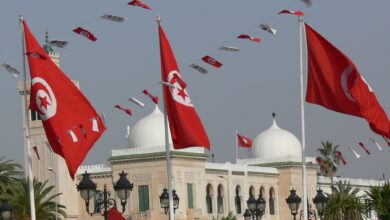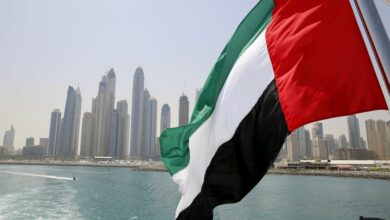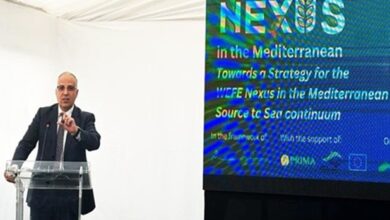A few months after the first democratic elections were held in Tunisia, a question that still hovers over this post-revolution political sphere is: Why did the Islamists win about 40 percent of the seats in the Constituent Assembly?
Ennahda's success came as a real surprise to Tunisians, certainly more secular ones, and foreign observers. How could we explain this political success? Were the 23 October elections the 'revenge' of Tunisia's margins and the marginalized?
Over the many weeks of election campaigning that preceded the elections, a dividing line was clearly drawn between two socio-geographical groups, separated by a wide gap. On one hand, there were the "secularists" representing the left with its various components, the liberals and more generally the upper end of the middle class and the bourgeoisie.
Geographically, this first group was mainly in the rich, developed and urbanized regions of the north and the Tunisian coastline, particularly in the rich neighborhoods of the capital, Tunis, and other big cities. This first group — largely French-speaking, in control of the media and a large part of the key sectors of the economy — felt eager to protect its interests and threatened by the arrival of the Islamists to the Constituent Assembly. It mobilized behind the secular parties and held a modernist discourse around the slogan of protection of individual freedoms and women's rights that have long made Tunisia an exception in the region.
This first group has utilized every means at its disposal to scare voters by demonizing the Islamists and presenting their possible takeover of power as a return to a dictatorship with even fewer rights than before 14 January 2011. Some have even ensured that Zine al-Abidine Ben Ali and Habib Bourguiba before him had "protected" and favored individual liberties — not the political ones — and the rights of women. Bourguiba, who had established the status of Tunisian women and granted them important rights, had adopted a less orthodox jurisprudence. On Facebook, some secularists did not hesitate to describe those who vote for Ennahda candidates as "traitors."
As for the second group, they are mostly located in marginalized regions and mainly include the lower-middle class, which was the social engine of this revolution. Geographically, this second group is located in the center, south and west of the country. It includes those living in poor neighborhoods of big cities who are mainly unemployed youth occupying the bottom echelons of the middle class. This is in addition to employees of the service sector, who are mostly conservative and non-Francophone, and have strong ties to traditional values and religion. They are in many ways no less conservative than the inhabitants of villages and isolated rural areas.
Most of this group voted for the Ennahda lists, as the map of the votes obtained by Rached Ghannouchi's Islamist party clearly shows. In response to the anti-Islamist campaign and discourse of the first secular group, they responded by giving confidence to the Islamists, showing their desire for Ennahda candidates to represent them in the national institutions. There are various reasons behind this vote of confidence, but it is also indisputable that it reflects certain social expectations, such as justice and dignity, more than it speaks to certain ideological devotions.
Certainly one wonders why these poorer groups have not chosen a different political party. But it seems that the vote has been precisely against leftists and liberals more than it was for Ennahda. One can argue that it was largely a protest vote, or a vote of resistance, so to speak. Ennahda has, however, drawn a certain image of itself, namely as "victims," moralistic, reassuring and promising — an image that contributed to alluring voters. This is, of course, is in addition to the negative image of the first secular group, which is perceived as disdainful, preoccupied by its own class interests, detached from the problems of people, a "party of France" and "bad" Muslims, if not atheists. Ennahda has no doubt benefited from this stigma imposed on secularists.
Moreover, the Tunisian elections have shown that this division between the two groups extended to Tunisians living abroad, whose votes mirrored the same percentages in favor of Ennahda inside the country. The voting outcome of Tunisians abroad was the second surprise in these elections. Tunisians abroad, relatively wealthy and aware of social and even international geopolitical debates, had massively given their votes to the Islamists. This is likely due to their identification with their social and regional origins. Their vote might also be a protest against Islamophobia and outright racism that they experience in their host countries. Again, Tunisian immigrants' marginality in Europe seems to have led them to vote in favor of a political party that celebrates an Arab-Islamic identity. Additionally, we cannot overlook that many Islamists who suffered from political persecution in Ben Ali's era were forced to leave Tunisia and live abroad. During their exile, they invested heavily in the mobilization of expatriate Tunisians. They managed to form complex networks that were both efficient and organized, ultimately aiding them during the latest election campaign.
Ennahda's members in particular were heavily persecuted by the dictatorship that imprisoned them, forced them into exile and deprived them of all sources of income under various pretexts. Now, they have harvested the gains of their long struggle. Nevertheless, their victimization, which is obviously a very effective weapon, cannot be the only factor for their success. There are other reasons that motivated the voting for Islamists: first, the political and cultural vacuum carefully engineered by the dictatorship to avoid any possible competition and development of opposition forces that could threaten the regime; second, the conservatism of a large part of rural and marginalized areas of south, central and western Tunisia; third, the lack of access to alternative sources of knowledge, such as films, theater, books, travel, etc., to women of lower social classes; fourth, the striking rates of unemployment among the youth, including thousands of unemployed graduates who have virtually no chance of finding a job because of the geographical distance from the job market; and finally, the marginalization in recent decades of thousands of civil servants, teachers, nurses and engineers working in peripheral areas.
In addition, Ennahda's flawless organization in comparison to the fragmentation of its opponents, as well as its access to a generous pool of financial support, has improved its chances of victory. Gulf countries, especially Qatar and Saudi Arabia, provided Ennahda with generous financial resources that have mostly been used to distribute money and food aid to families in need.
Finally, we can say that if the success of the Islamists is indisputable, they first owe it to their opponents, who led a negative campaign against Ennahda using an alienating rhetoric on modernity that excluded a large part of the population whose access to power, wealth, knowledge and information is limited. The Islamic winners did not, however, receive a blank check. Many among those who voted for Ennahda last October could easily end up in the opposing camp if voters are disappointed by broken promises, or if they sense a return to dogmas that are too radical and conservative.
Habib Ayeb is a Tunisian geographer and research associate professor at the American University in Cairo's Social Research Center.




